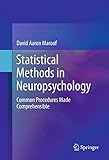Statistical Methods in Neuropsychology [electronic resource] : Common Procedures Made Comprehensible / by David Aaron Maroof.
Material type: TextPublisher: New York, NY : Springer US : Imprint: Springer, 2012Edition: 1st ed. 2012Description: X, 110 p. online resourceContent type:
TextPublisher: New York, NY : Springer US : Imprint: Springer, 2012Edition: 1st ed. 2012Description: X, 110 p. online resourceContent type: - text
- computer
- online resource
- 9781461434177
- 612.8 23
- QP351-495
- QP360-360.7
| Item type | Current library | Home library | Collection | Status | Barcode | |
|---|---|---|---|---|---|---|
 E-books
E-books
|
Library and Information Centre | Library and Information Centre | SN | Available | EBK53207 |
Statistical Methods in Neuropsychology Common Procedures Made Comprehensible David Aaron Maroof Statistics: not only the bane of many a student’s existence, but also puzzling to any number of mental health professionals. At the same time, they are necessary in making sound clinical judgments as to clients’ cognitive functioning or decline. Without them, a practitioner may be at a loss to explain findings or recommendations, or understand data in context. The first publication of its kind, Statistical Methods in Neuropsychology brings the broad field of applied statistics and the specialized field of neuropsychology together to simplify and demystify test results. In readable, at times downright funny prose employing the minimum of hard math (and even less hard jargon), this concise volume shows readers how to effectively translate psychometric test data into real-world clinical practice, and offers a fuller understanding of the research literature. The author critiques commonly used statistical methods on the basis of their strengths and weaknesses, and reviews the issues in these key areas: • Assessing validity. • Statistical assumptions. • Exploratory factor analysis. • Normative data. • Covariates and covariance analysis. • Regression and logistic regression analysis. • Multivariate analysis of variance. Statistical Methods in Neuropsychology will appeal to a wide variety of neuropsychologists, cognitive neuroscientists, psychiatrists, and experimental psychologists: those who understand statistics but want to know the why behind them, those new to the field and still getting familiar with the formulas, and those wishing to retake the course with a witty, world-class professor. .
There are no comments on this title.

